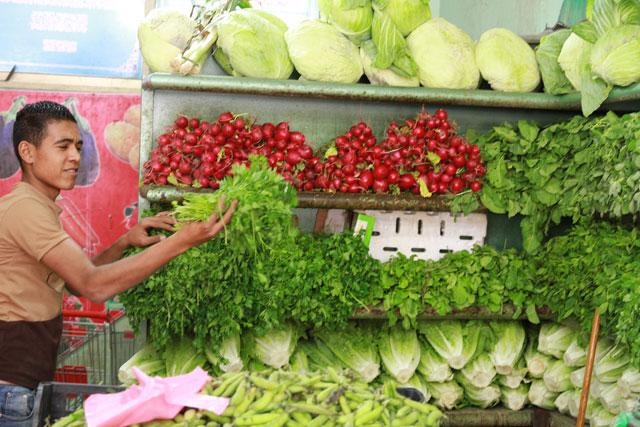You are here
Farmers urged to grow 'more lucrative' leafy greens instead of conventional produce
By Hana Namrouqa - Apr 27,2016 - Last updated at Apr 27,2016

Jordan's main exports of leaf vegetables include mallow, basil, thyme, spinach, fennel, lemongrass, gundelia, coriander, garlic, grape leaves, corchorus, mint and sage (Photo by Hassan Tamimi)
AMMAN — The Ministry of Agriculture on Wednesday urged farmers to focus on growing leaf and root crops, whose exports generate more than triple the profit generated from exporting vegetables.
During the past month, the Kingdom exported 357 tonnes of leaf vegetables to 12 countries, generating profits worth JD500,000, according to the ministry's spokesperson, Nimer Haddadin, noting that 1,300 tonnes of conventional vegetables have to be exported to generate the same revenue.
"The ministry is encouraging more farmers to switch from growing conventional vegetables to leaf greens, which are high-value crops and are on very high-demand at international markets, particularly in Europe," Haddadin told The Jordan Times.
Exporting one tonne of conventional vegetables generates $350-$500, whereas exporting one tonne of leaf greens generates $1,500-$2,000, according to the ministry's figures.
"Jordan is one of the major exporters of leaf vegetables and medicinal herbs in the Arab region," Haddadin said.
The Kingdom exports its leaf crops and medicinal herbs to Denmark, Sweden, Germany, the UK, Canada, the Netherlands, the United Arab Emirates, Bahrain, Kuwait, Oman, Qatar and Lebanon, according to the ministry.
"Not only does shifting to unconventional cultivations, such as leafy vegetables, generate higher income, but it also reduces marketing congestion at the local market and opens new portals for farmers and exporters," Haddadin said.
Jordan's main exports of leaf vegetables and medicinal herbs include chamomile, broccoli, green onion, parsley, watercress, garlic, red carrot, mallow, basil, thyme, spinach, fennel, lemongrass, gundelia, coriander, grape leaves, corchorus, mint and sage, according to the ministry.
Related Articles
Jordan’s exports of fruit and vegetables during the first nine months of this year increased by 14 per cent compared to the same period last year, government officials said on Wednesday.
AMMAN — A recent decision to exempt agricultural exports via air cargo from fees will support the sector and enhance the competitiveness of
AMMAN — Fruit and vegetable exports dropped by 11.3 per cent last year compared to 2014, Agriculture Ministry Spokesperson Nimer Haddadin sa













